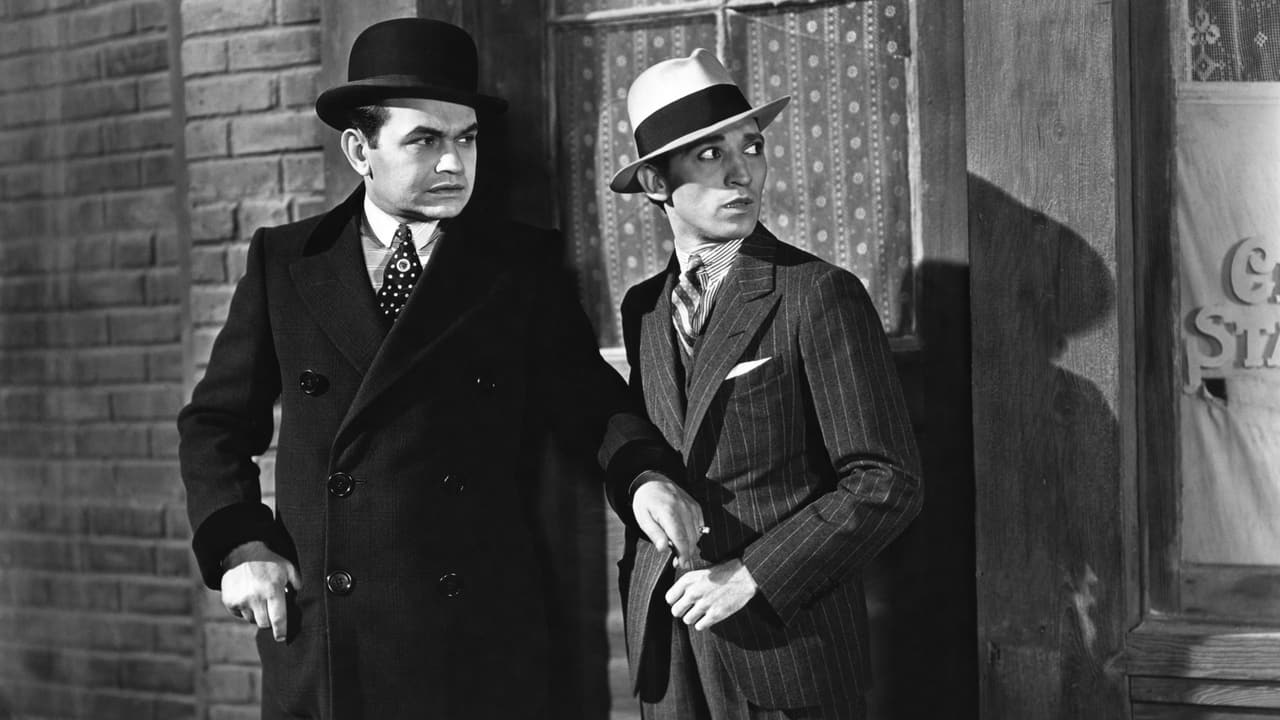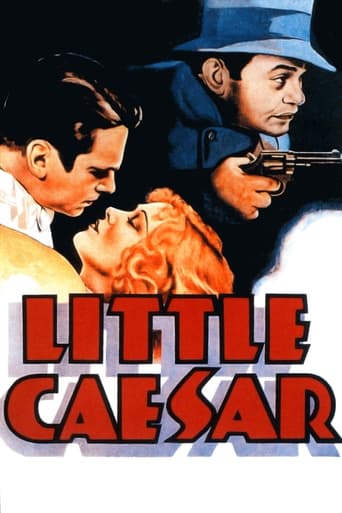

Far from Perfect, Far from Terrible
... View MoreA bit overrated, but still an amazing film
... View MoreIn other words,this film is a surreal ride.
... View MoreTrue to its essence, the characters remain on the same line and manage to entertain the viewer, each highlighting their own distinctive qualities or touches.
... View MoreI had seen many clips of this film, and I knew it was a classic gangster movie, it was great to know that it was the first ever to have spoken dialogue, and I was definitely going to see it because it was in the book 1001 Movies You Must See Before You Die, from director Mervyn LeRoy (Mister Roberts). Basically Caesar Enrico 'Rico' Bandello (Edward G. Robinson) and his friend Joe Massara (Douglas Fairbanks, Jr.) are small-time criminals who are seeking their fortunes in Chicago, and while Rico, also nicknamed Little Caesar, joins Sam Vettori (Stanley Fields) and his gang Joe is more interested in becoming a professional dancer, and he gains a partner and girlfriend with Olga Stassoff (Glenda Farrell). Joe tries to get away from the gangster lifestyle and any involvement in their schemes, but he is made to participate in the robbery of the nightclub he works in, along with Rico who was given orders from underworld overlord 'Big Boy' (Sidney Blackmer) not to open fire and create bloodshed, but he kills Crime Commissioner Alvin McClure (Landers Stevens), his shocked friend witnessed it. Gang leader Sam is accused by Rico of being soft, and he is allowed to take control over the crime ring, and with this happening an assassination attempt on him is organised by rival boss 'Little Arnie' Storch (Maurice Black), but it fails and he is only grazed, so they visit him and his gunmen, after the men quickly leave for Detroit, and Rico gains control of Chicago's Northside as well. With Joe gaining a good reputation as a dancer and hardly seeing his former friend, and he is visited by the now gang lord who is concerned he knows a lot, he is told to forget about Olga and return to the life of crime, and he is threatened if he does not accept, he refuses anyway, and following this Olga calls Police Sergeant Flaherty (Thomas E. Jackson) so he can talk. Rico and his henchman Otero (George E. Stone) shortly after the call come round, Rico aims his gun to kill Joe before he can spill about the crime activities, but he cannot bring himself to pull the trigger, and when Otero tries to kill him Rico wrestles to take his gun, and in the scuffle Joe is wounded with a gunshot, this is heard by Flaherty who chases and kill Otero running out. Joe provides the information to the police and Flaherty is determined to bring down Little Caesar and his empire, and knowing that he is a wanted man Rico disappears to a life on the streets, and sometime later he sees the news that he is branded a coward, enraged he foolishly calls the cops to announce he is coming back, and the call is traced, Rico tries to escape but is gunned down and killed behind a billboard by Flaherty, and ironically it has an advertisement poster featuring Olga and Joe. Also starring William Collier Jr. as Tony Passa, Ralph Ince as Diamond Pete Montana and Armand Kaliz as De Voss. Robinson gives a fantastic leading performance, he may not look like the typical kind of character that will climb in the crime world to become the kingpin, but he proves a sly and ruthless criminal and steals every scene, the other cast members such as Fairbanks Jr. and Farrell are good as well. The story is pretty easy to follow, a lowlife crook slowly becomes the most wanted man in the city, based on the real life mobster Al Capone, there is a great script with witty dialogue, and many memorable moments with guns shooting and criminal schemes, and of course the final catchphrase, this is absolutely a must see classic crime drama. It was nominated the Oscar for Best Writing, Adaptation. Caesar Enrico Bandello was number 38 on 100 Years, 100 Heroes & Villains, and "Mother of mercy, is this the end of Rico?" was number 73 on 100 Years, 100 Quotes. Very good!
... View MoreThe ambitious criminal Rico (Edward G. Robinson) moves from the country to the big city in the east and joins Sam Vettori's gang with his friend Joe Massara (Douglas Fairbanks)...I have to say this was a fun, enjoyable film, and it clearly inspired many other gangster films of its era. Not to mention the fact that the chief piece of anti-organized crime legislation was named after the lead character of this film... it has sealed its place in history.I will say that time has not necessarily been good to the picture. The sound is poor at times, the video fuzzy, and it really needs a better restoration than the DVD that Warner Brothers produced. Also, it has moments that may have been good for 1930s viewers, but come across as unintentionally funny now.
... View MoreLittle Caesar is a good example of a film that is historically important but which has dated very poorly. The camera work, by cinematographer Tony Gaudio, is mediocre, the spare soundtrack, by Erno Rapee, is garbled, and the acting very wooden. Even Edward G. Robinson, who became a star in this role, is merely OK. What makes this all the more amazing is that, just a few months later, in 1931, Jimmy Cagney would burst on to the screen with The Public Enemy, a film that holds up cinematically- technically and aesthetically- far better. Directed by Mervyn LeRoy, and written by Francis Edward Faragoh and Robert N. Lee, adapted from a novel by W.R. Burnett, the 78 minute, black and white film, limps along, despite being nominated for a Best Adapted Screenplay Academy Award. So unsure of its narrative power is the film that, like its silent era cousins, it makes extensive use of intertitle cards to convey plot points quickly, and also obscure the narrative fact of its indeterminate chronology.That's because there is a general awkwardness to this film that many early talky pictures had, and the acting style is unconvincing. There are scenes which simply make little sense, diegetically or not, and clank along in stereotypes. Aside form The Public Enemy, and the Paul Muni vehicle, Scarface: The Shame Of A Nation, one might also compare it to German Director Fritz Lang's film M, released the same year, which made a star of Peter Lorre, another rather un-movie star-like movie star. In that film, Lorre plays a pedophile child killer done in by a trial brought by local gangsters, enraged that his killings have brought the wrath of the cops down upon them. That film, like The Public Enemy, is far more realistic in its depictions of crime, criminals, and their motivations.
... View MoreAs the first mobster to make a big dent in cinema, Rico "Little Caesar" Bandello deserves respect. But does he make for a great movie? I say no.After a final gas station hold-up, Rico (Edward G. Robinson) and pal Joe Massara (Douglas Fairbanks Jr.) breeze into the big city to score with mob boss Sam Vettori (Stanley Fields) and his crew. Soon Rico is the one running things, but will his itchy trigger finger and habitual line-stepping run him afoul of police Sergeant Flaherty (Thomas E. Jackson)?"The bigger they come, the harder the fall," Rico boasts. "I ain't doin' bad in this business so far."The problem with "Little Caesar" is obvious from the start and more so as the film progresses: Rico is an idiot. He only makes it as far as he does because all the hoods he messes with, like Sam, are even dumber. When he takes over Sam's gang, he just tells Sam he's through and that's that. When he wants to make a statement about running things, he throws a party and invites the papers. When he starts shooting, he zaps the new crime commissioner and then tells everyone to mind not to say nothing about it.Maybe if the film showed this to be dumb behavior, I'd feel a little different. But instead this is suggested as being the typical road to hoodlum hegemony, and highly effective if not for a human foible or two that slip Rico up.Robinson stands out in the flawed proceedings almost as much by default as by his considerable talent. He's great with his rough banter, and his flourishes with his cigar, but he is playing a Snidley Whiplash caricature and it shows.It reminds me of another Romanian-born actor who made his big splash in movies the same year, Bela Lugosi in "Dracula." Both films are atmospheric potboilers focused on a single over-the-top villain. Both are sadly diminished by time with their formulaic conventions, weak supporting cast, and creaky early-sound production.When "Little Caesar" wants to project menace, we see Rico warn people "my gun's gonna speak its piece," only he doesn't really do much with it. Fairbanks is lost as a lamb in a hurricane playing Joe, especially when he hooks up with Glenda Farrell and tries to make his break from Rico, a matter the film pushes into the background until the last 15 minutes. Watching Fairbanks and Farrell have their clinches reminds you of what was so wrong with early talkies: Even in a clinch, the lovers always shouted at each other.Though a Pre-Code film, "Little Caesar" makes strange concessions to regional censors. When someone is shot, director Mervyn LeRoy is careful not to show Rico or anyone else actually pulling the trigger. There's no mention of booze, or vice, or any other illegal activity. Apparently these guys make all their money holding up each other's parties.Critics looking at the film today scrape for matters of interest such as Rico's possible homosexuality, and the matter of how mob activity might be seen as mirroring big business. But in the end, what you get here is a thin story featuring a character who defies gravity and convention without doing very much of anything interesting.Maybe I should be more grateful to "Little Caesar" for paving the way to other, better gangster films of the 1930s. By itself it is a curio more than anything else, testament to one big talent who left a lasting impression but would make his mark on better films to come.
... View More